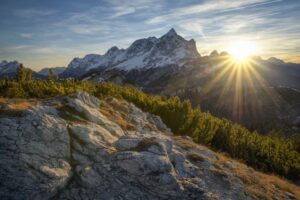(Personal, Potential, Intentional, Political) & FROGS)

The Dharma talk given by Shokai Steven Hart this last Sunday stirred up some reactions of discomfort, as he strayed from the politically correct restrictions we usually impose upon ourselves to avoid controversial topics that recall public conflicts over such hot-button issues as climate change, and the inevitably divisive nature of how such concerns are treated in public. Those who do not know Steve should understand that he is a geologist, and is called upon to testify in legal disputes over such issues on a frequent basis, and so is coming at this topic, not from the propagandistic angle that most of us are stuck with, but from a scientific perspective (in the non-partisan sense) of one who has actually done some of the math.
The gist of his talk had to do with how we do (and do not) recognize and react to threats to our wellbeing (as contrasted with squirrels, who are hardwired to cope well with threats from predator hawks while up in the trees, but not so much with those from vehicles in the streets). Human beings are likewise hard-wired to recognize only certain kinds of threats, like big guys with clubs, but not so much invisible threats like climate change. That his very introduction of this subject raised some hackles neatly confirmed one of his points – that we suppress this kind of potential threat until we are forced to face it on the personal level, as in the horrific examples of irrefutable evidence he cited. That this has been made a political football says more about the state of our public discourse than it does about the facts.
Zazen is not an escape from the realities of the world, and we should not try to (mis)use it as such.
zenkai taiun michael elliston, roshi
It reminded me of Matsuoka-roshi’s frequent reference to the frog as a positive, even inspirational symbol of Zen meditation, zazen. Listen to my podcast on Dhyana, or Contemplation, for details. The frog sits quietly, appearing to be asleep, but is fully alert, and so represents our state of awareness in zazen. But a frog, it is said, while it will not allow you to put it in a pot of hot water, but will jump to safety; yet will sit in the pot of water until it is cooked to death, if you increase the temperature gradually. This is one serious downside to being a frog, and a cautionary tale for us. Zazen is not an escape from the realities of the world, and we should not try to (mis)use it as such.
Another, related, downside to being a frog — or a toad — is that, probably because they breathe by osmosis through their skin, they are extremely sensitive to changes in the environment, whether they can perceive them or not. Thus, like the canary in the coal mine, they are dying off and going extinct at an alarming rate all over the globe, warming or not. Place your bets and remember the odds favor the house.
If your only concern is your appetite for frog legs, this is no big deal, but if you are capable of connecting one dot to another, it is a big honking deal. The klaxons should be screaming from every rooftop. But that would disturb our sleepwalking. This is true, in Buddhism, even if global warming is not.
The angst engendered by the intrusion of this clarion call into the serenity (some might say somnolence) of the zendo environ is an indication that we all know that something is amiss, but are not sure what, nor how much we should be paying attention to it, let alone doing something about it. References quoted included a contemporary psychologist (?) who outlined differences in our reactions to the personal and intentional threat (e.g. 9-11 — NIMBYing inmates from Guantanamo Bay – big men with clubs) as opposed to the invisible, lurking threats (not to worry – won’t bring the big CC up again).
Other references were from — surprise: Master Dogen! — from Eihei Koroku, Dogen’s Extensive Record (or, as Okumura-roshi, who helped translate, calls it, Dogen’s Expensive Record). We all owe a huge debt of gratitude, particularly to Okumura-roshi and to Taigen Dan Leighton, and the others who contributed to making this great work available to us, in a language we can understand — even if we can not understand the teachings. Also to Shokai, for reminding us that this great treasure is sitting there on the shelf at Zen Center, all unknown.
The key take-away that I see, is that from the personal, political, potential and intentional perspective, nothing is more of an invisible threat than life, this very existence. It far overshadows any particular threat we can isolate. As Shokai mentioned in passing, the three poisons — greed, hatred, and delusion — are like fires that are burning. But this very existence is burning, according to Buddhism, burning day and night, unceasingly. Life is threatening ourselves with personal, potential, and intentional harm. All politics is local, but this is personal.
As I mentioned, we didn’t start the fire (thank you Billy Joel), and our mission in Zen is not to put out the fire, in the sense of fixing the world. Like the children in the burning house, Shokai mentioned in Buddha’s parable, our mission is to get out of the house, to save ourselves, and to bring as many others with us as will come. On the other hand, we commit, through the Bodhisattva vow, to be reborn into the same burning house, for eternity.
Speaking of Bodhisattvas, one of the references was to Bodhidharma’s interview with Emperor Wu, in which the Emperor inquired as to the absolute truth, and the answer was “Vast emptiness, nothing holy” or sacred (it is translated variously). The great leader did not get it, so he inquired further as to who this was in front of him, and Daruma said, “I don’t know.” In the story, this interview, which was ostensibly the emperor interviewing the red-bearded barbarian, 28th Patriarch (1st in China), turned out to be the other way around. The great sage, after interviewing the emperor, could tell that this region of China was not ready for prime time, and so made his way north to Shaolin Temple (J. Shorinji). Yes, Verginia, there is a Shaolin Temple. It was, and is, a real place, not a figment of Kung Fu fantasy.
I hazarded an opinion that his second answer was more along the lines of “Don’t know,” as the Chinese language — which we presume Bodhidharma had bothered to learn, like any polite tourist traveling to a foreign land — does not, I think, utilize the personal pronoun. Any scholars out there, I already stand corrected, and bow to your superior wisdom. But my point is that “Don’t know” is an entirely different statement than “I don’t know” (and besides, I have seen it translated that way. Again, many deep bows to the translators, and their unrelenting efforts on behalf of Zen.)
Don’t know indicates that the answer to this question is not known, not knowable, and is the basis of the Don’t-know mind, highly revered in Buddhism. Shokai quoted Donald Rumsfeld (perhaps to allay any misguided conservative fears of a liberal bias amongst Zen practitioners) as saying that there are knowns, known unknowns, and then there are unknown unknowns, in making decisions about waging war, in Iraq, for example. Shokai went on to make the germane point that in zazen, we recognize the knowns, and are aware of the known unknowns, but setting all that aside, proceed to confront even the unknown unknowns, which, perhaps, progressively then become known unknowns. Or something like that. I may be embellishing here.
Back to “I don’t know” — is too personal for Bodhidharma, too focused on himself and what he knows or doesn’t know, as if that had any relevance or importance to the question asked. This I, this person, is not known, in Zen, because it cannot be found. It can only be made up, and must forever be propped up with a lot of wasted energy. Nobody knows the answer to this question, because the answer is un-knowable. It is a question without an answer. A Zen question. The more appropriate form is: What is it that stands before me? Don’t know.
Before we leave the political consequences behind, I again (stop me before I opine again) pointed out — after a newcomer very politely expressed concern that he may have stumbled into a den of liberal iniquity masquerading as Zen — that from Zen’s perspective everyone is a liberal, and everyone is a conservative. Those identified; and self-identified; and polarized and pilloried as such; all alike wish to liberalize — and to conserve — only different things. And that in Zen, we all register as interdependents. I should have pursued that standup career after all. At least the pay might have been better.
Another salient reference was to a comment Dogen quoted from Master Nansen in Eihei Koroku, concerning knowing and not-knowing. Something to the effect that knowing is delusion, not-knowing is “blank consciousness.” We need to be somewhat careful of translator’s choices, where the Chinese term rendered as blank might be otherwise interpreted, e.g. as bare, undifferentiated, and so forth. It does not necessarily mean what we may think of as blank, as in blanked-out, or unconscious.
I surmise that Nansen refers to what a particular line means in the original translation into English of the Sutra that we chanted at Chicago Zen Buddhist Temple, at the end of the long line of things that fall away in zazen: “…until we come to no consciousness also.” This no consciousness is not the absence of consciousness, as in passing out, or being knocked out, but the flip-side of consciousness, parallel to what is meant by “…no sight, no sound, no taste, no touch, no object of mind, no realm of mind-consciousness.” Or what is meant by the emptiness of the skandhas. Given emptiness, sensation has a flip-side of no-sensation; it does not mean that sensation has ceased to be. Same for consciousness. Yin-yang.
A smaller quibble is with reading Master Dogen’s reference to stupid people who insist on reifying an entity called self from this flux of arising, abiding, changing and decaying. The emphasis is not “stupid people,” as if there are only some people who are so stupid as to not get this, unlike us enlightened ones, looking down our noses at the poor fools. It should read “stupid people.” People are, after all, the only living beings capable of waking up to the truth, yet they insist on getting it wrong.
Stupid here means incapable of learning, or stubbornly unwilling to learn. It is not the same as ignorant, which in Buddhism is not a pejorative, but simply the Truth, though perhaps truly tragic. Original Ignorance, in the Buddhist 12-fold chain, is of an innocent kind. Everything arises out of this blissful ignorance. Including most human birth (Bodhisattvas and Buddhas excepted). This fact does not, however, excuse human stupidity, especially of the willful sort. But it is important, in this context, to recall Master Dogen’s statement in Fukanzazengi:
Zazen is a practice
beyond the subjective and objective worlds
beyond discriminating thinking
therefore no distinction should be made
between the clever and the stupid
Here the translator’s selection of stupid may well have been chosen over unintelligent. It is unlikely that Master Dogen means intentionally unwilling to learn in this instance, as he is indicating that even the “stupid” can benefit from zazen, can even succeed to Buddha’s awakening. This is meant to disabuse us of the notion that our vaunted IQ will assure us of awakening.
It is also important to understand that Master Dogen is painting a picture of reality — and particularly, de-bunking prevalent misconceptions about Zen practice — specifically for the benefit of his live audience. His speaking and writing (scribed by others in Eihei Koroku) is primarily directed toward his own students and successors (including us). He is saying, in all of these remarks that may appear to criticize his contemporaries, essentially: Do you see yourself in this picture? Or, If the shoe fits, wear it. Like all of the great masters, his primary mission was the welfare of his sangha, and his message primarily to them, not so much an effort to defend his practice against the prevailing currents of conventional wisdom, though he did have an uphill swim.
As do we today. In Zen, either on the cushion, or when opening your mind up to Master Dogen’s central message, just Don’t. Give. Up. Dogen didn’t. He is pointing to what is in front of our face.
Sorry if you missed the talk; it was not recorded, so can only be found in the Akashic Records. Until next time.Gassho,
Great Cloud









